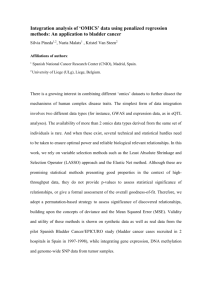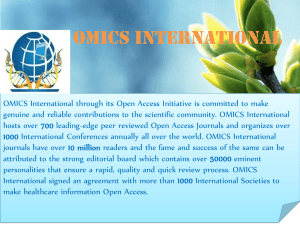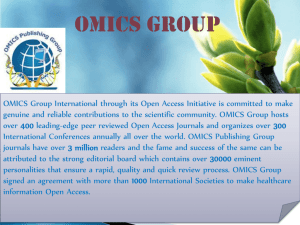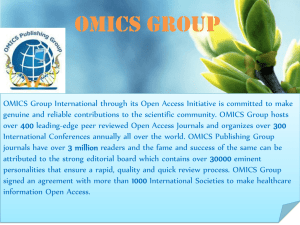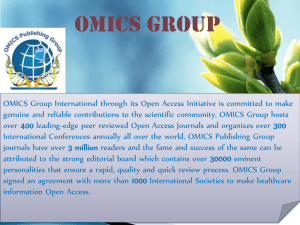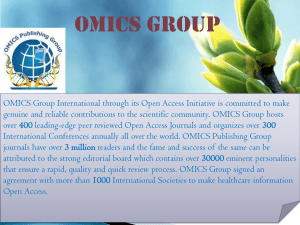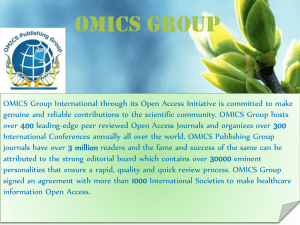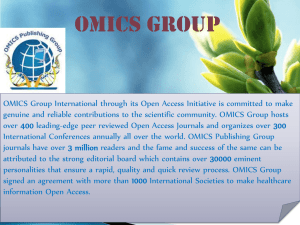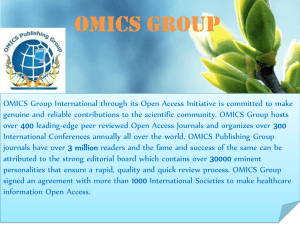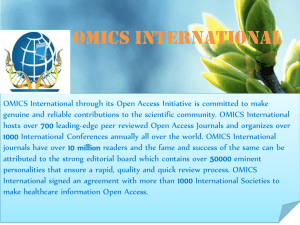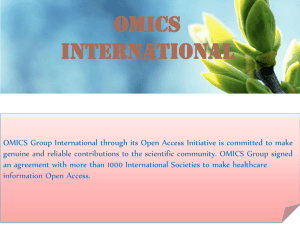PPT Version - OMICS International
advertisement
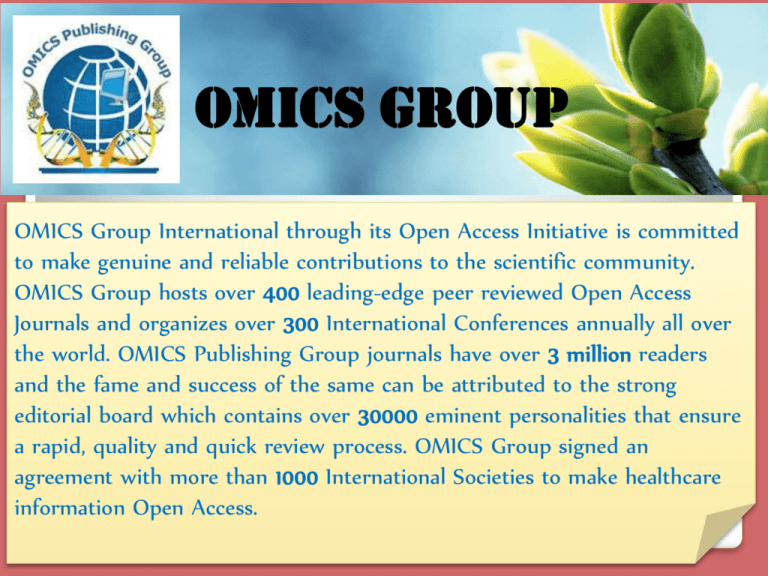
OMICS Group OMICS Group International through its Open Access Initiative is committed to make genuine and reliable contributions to the scientific community. OMICS Group hosts over 400 leading-edge peer reviewed Open Access Journals and organizes over 300 International Conferences annually all over the world. OMICS Publishing Group journals have over 3 million readers and the fame and success of the same can be attributed to the strong editorial board which contains over 30000 eminent personalities that ensure a rapid, quality and quick review process. OMICS Group signed an agreement with more than 1000 International Societies to make healthcare Contact us at: contact.omics@omicsonline.org information Open Access. OMICS Journals are welcoming Submissions OMICS Group welcomes submissions that are original and technically so as to serve both the developing world and developed countries in the best possible way. OMICS Journals are poised in excellence by publishing high quality research. OMICS Group follows an Editorial Manager® System peer review process and boasts of a strong and active editorial board. Editors and reviewers are experts in their field and provide anonymous, unbiased and detailed reviews of all submissions. The journal gives the options of multiple language translations for all the articles and all archived articles are available in HTML, XML, PDF and audio formats. Also, all the published articles are archived in repositories and indexing services like DOAJ, CAS, Google Scholar, Scientific Commons, Index Copernicus, EBSCO, HINARI and GALE. For more details please visit our website: http://omicsonline.org/community-medicine-health-education.php Professor School of Medicine Stony Brook University USA Editor-in-chief of Journal of Community Medicine & Health Education Bio-Sketch Norman H. Edelman, M.D. is Professor of Preventive Medicine, Internal Medicine, and Physiology and Biophysics at the State University of New York at Stony Brook. From 1996 - 2006, he served in a dual capacity as Vice President for Health Sciences and Dean of the School of Medicine at Stony Brook. A graduate of Brooklyn College, Dr. Edelman received his M.D. degree from New York University, where he was elected to the Alpha Omega Alpha honor medical society. He received postgraduate training at Bellevue Hospital in New York City and went on to be a Research Associate at the National Institutes of Health, National Heart Institute, and then Visiting Fellow in Medicine and Advanced Research Fellow of the American Heart Association, Cardiorespiratory Laboratory, Columbia University, College of Physicians and Surgeons, Presbyterian Hospital. Research Interests Health care policy, with an emphasis on workforce issues Preventive Medicine Internal Medicine Physiology and Biophysics Publications The Cost of Primary Care Doctors. S Glied, AG Prabhu and N Edelman. Forum for Health Economics & Policy, 2009 Improving Asthma Outcomes: Evidence Based Health Policy Priorities. K Pruitt, J Nolen, L Garcia-Reyes, N Edelman and N. Schachter. Pediatric Asthma, Allergy & Immunology. 22 [4] 189-196, 2009 TB Ought Not to Be. N Edelman. Public Service Review: European Union [#19] PSCA International, LTD, UK, 2010 Who Will be The Generalists of the Future? KGH Okma, ME Janoff and NH Edelman, Journal of Health Policy, Politics and Law, under revision Introduction Health care Definition : The act of taking preventative or necessary medical procedures to improve a person's well-being. This may be done with surgery, the administering of medicine, or other alterations in a person's lifestyle. These services are typically offered through a health care system made up of hospitals and physicians Health care (or healthcare) is the diagnosis, treatment, and prevention of disease, illness, injury, and other physical and mental impairments in human beings. Health care is delivered by practitioners in allied health, dentistry, midwifery (obstetrics), medicine, nursing, optometry, pharmacy, psychology and other health professions. It refers to the work done in providing primary care, secondary care, and tertiary care, as well as in public health Health care Health care practice Access to health care varies across countries, groups, and individuals, largely influenced by social and economic conditions as well as the health policies in place. Countries and jurisdictions have different policies and plans in relation to the personal and populationbased health care goals within their societies. Health care systems are organizations established to meet the health needs of target populations. Their exact configuration varies between national and subnational entities. In some countries and jurisdictions, health care planning is distributed among market participants, whereas in others, planning occurs more centrally among governments or other coordinating bodies. In all cases, according to the World Health Organization (WHO), a well-functioning health care system requires a robust financing mechanism; a welltrained and adequately-paid workforce; reliable information on which to base decisions and policies; and well maintained health facilities and logistics to deliver quality medicines and technologies Structure of Health care The structure of health care broadly includes the facilities (e.g., hospitals and clinics), personnel (e.g., number of nurses and physicians), and technology that create the capacity to provide health services. Structural characteristics are expected to influence the quality of health care services. One component in the accreditation of health care facilities (e.g., hospitals, nursing homes) is the review of the adequacy of structural characteristics, including staffing, on-call resources, technology, and support services (laboratory, pharmacy, radiology). The structural resources of health care facilities and organizations are the foundation upon which quality health care services are provided. Outcomes The value of health care services lies in their capacity to improve health outcomes for individuals and populations. Health outcomes are broadly conceptualized to include clinical measures of disease progression, patient-reported health status or functional status, satisfaction with health status or quality of life, satisfaction with services, and the costs of health services. Historically, quality assessment has emphasized clinical outcomes, for example, disease-specific measures. However, disease-specific measures may not tell us much about how well the patient is able to function and whether or not desired health outcomes have been achieved. To understand the patients’ outcomes, it is necessary to ask patients about their outcomes, including health status, quality of life, and satisfaction with services. HSR has developed valid and robust standardized questionnaires to obtain patient-reported information on these dimensions of health outcomes. As these are more widely applied, we are learning about the extent to which health care services are improving health. Outcomes Related Journals Health Care : Current Reviews Occupational Health Affairs Journal Practice Internal Access Medicine & of General Medicine: Open Related Conferences OMICS Group Open Access Membership OMICS publishing Group Open Access Membership enables academic and research institutions, funders and corporations to actively encourage open access in scholarly communication and the dissemination of research published by their authors. For more details and benefits, click on the link below: http://omicsonline.org/membership.php
